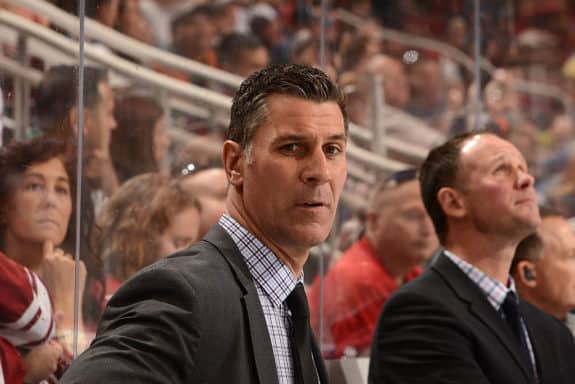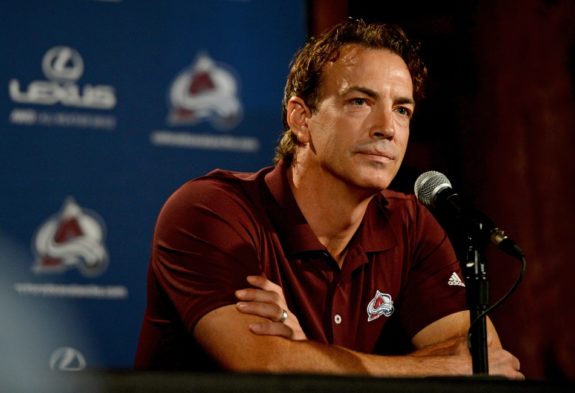After the Colorado Avalanche lost Game 7 of the second round of the Stanley Cup Playoffs in dramatic fashion, the team did something unique. The Avalanche took the high road.
Even though a questionable call overturned a game-tying goal and drastically shifted the momentum in the second period, the team refused to dwell on the controversial ruling. The Avalanche elected to play the long game. It’s not something new for them, but it did set the team apart on the big stage.
The Offsides Ruling
In case you were in Siberia – or some other remote location – and missed the controversy, the Avalanche battled back from a 2-0 deficit to tie the game in the second period. Or did they?
The San Jose Sharks challenged the game-tying goal, claiming Avalanche captain Gabriel Landeskog was offsides. The captain had been standing along the sideboards, on the opposite side of the ice from the goal scoring action, with his left foot precariously perched on or near the blue line, while waiting to get to the bench.
The big hubbub came when the goal was overturned. Landeskog was on the ice, but definitely out of play, and the officials on the ice had not signaled a penalty. People waited to see the conclusive evidence required to overturn the on-ice call. It never really came.
The NHL handled the situation poorly – not really a surprise – taking over an hour to explain the ruling. When the explanation was finally released, it never addressed the ‘conclusive’ issue. Basically, the NHL included an excerpt from the rule book describing offsides and a clip of the same grainy video which everyone had seen on television. It appeared to show Landeskog’s left skate on the blue line while facing the door to the bench. Nothing else.
Questions arose about whether Landeskog had tagged up, whether his foot was on the blueline or raised, was he really in play, did his presence impact the scoring play (no, it didn’t), all of the questions that have surrounded the offsides rule since it’s implementation.
The ruling sent the Avalanche back to a one goal deficit after thinking they had tied it up. The Sharks capitalized on the deflated Colorado team less than four minutes later to gain a two-goal lead. The call was a momentum changer. While the Avalanche came back in the third, it wasn’t enough to win the game. They lost 3-2 in the Game 7, knocked out by an opportunistic Sharks team.
The Avalanche Response
In post-game interviews, Landeskog was asked numerous times about the questionable call. And his reaction surprised many. Instead of striking out at the referees, he swallowed the mistake, taking the blame.
“If I could have done something different on that play, I would have jumped the boards a lot quicker.”
Captain Gabriel Landeskog responded when asked about the play.

But Landeskog didn’t stop there. When pressed about the call, he responded with, “Hopefully, the linesmen got it right. Derick and Scott are out there working the game tonight…I don’t envy their position at all, to have to make a call in a game seven like this. It’s a tough job and a tough call to have to make but hopefully they got it right. So yeah, I’m gonna’ take the blame for that ‘cause I could have done a lot of things different. Ultimately, my skates were on the ice…” Gabriel Landeskog elaborated in his post-game interview.
Coach Bednar spoke even more directly..
“I don’t even want to talk about the offsides call, to be honest with you…It is what it is and for me, I am not going to talk about the officiating…We set high expectations for ourselves and we came up a little bit short…They (Sharks) were the better team for too big a portion of tonight’s game and they won,” the coach stated as he began his comments after the game.
The coach and the players had every opportunity to lambast the officiating and complain about the outcome, yet they didn’t. They acknowledged both their loss and the Sharks win. The Avalanche responded with class and professionalism. In doing so, they upheld the team’s standard of sticking to the long-term vision.
Avalanche Focus on the Big Picture
Lambasting the controversial call could have provided some momentary satisfaction but it would not have contributed to the organization’s big picture goals. The Avalanche are all about the long game.
Just two years ago, the Avalanche had finished their 48-point season and were the laughing stock of the NHL. They lost the number one draft pick in the lottery (twice in three years) yet did not publicly attack the league or complain about the process. National critics condemned General Manager Joe Sakic for hanging onto Matt Duchene too long after he asked for a trade.
Many people questioned the team’s roster management. Some were calling for both Sakic and Bednar to be fired.
But Sakic didn’t flinch. He stated they were keeping Bednar as they hadn’t given him a fair shot. They selected defenseman Cale Makar in the draft. Six months later, Sakic traded Duchene for a bunch of quality picks and players, far beyond what many though possible. Sakic didn’t argue with his critics. He just kept going about his business. Public restraint has become a hallmark of the organization.
Bednar is cut from the same cloth. When the goaltenders hit a two-month slump in the regular season, he kept an even keel. As the team struggled to re-discover their mojo over that period, he just continued to address issues. Bednar refused to disparage players, coaches or management. He worked the problem. And the team turned around.

Consider what that restraint builds – credibility. If a GM or an owner goes on a rant about every little thing, he loses standing. One can look at Ottawa’s Eugene Melnyk to see where that road can take an organization.
On the other hand, the Avalanche are building credibility. How many referees will be more willing to listen to Landeskog after he showed them respect? How many players now know they can trust their coach to have their back? How many free agents see what Colorado is building and want to get on board?
Embarrassing the NHL and harassing the referees publicly is not good for any team’s long-term hopes. Hockey is a small world. Burning bridges for momentary satisfaction is short-sighted. Investing in good relations with both entities can only help future communications, even though that may be the more challenging path.
Fighting For a Stanley Cup Future
Sakic, Bednar, and Landeskog all know the vision. This playoff run, while a solid performance, is just the beginning for the Avalanche. They are aiming to be postseason regulars, building towards becoming Stanley Cup Champions. Comporting themselves well in adversity will bring great dividends down the road.

Just as Sakic, Bednar, and Landeskog have steadily persevered through all the storms involved with rebuilding the organization, the Avalanche aim to leverage the challenges to build success. In a couple of years, they intend to play for the Cup in the finals. Banking a little good will now could pay off big down the road.
The vision is for an extended culture of accomplishment. Even if it stings in the moment, the future grows even brighter. The Avalanche are playing the long game, willing to sustain some short-term hits in order to attain their long-term vision.